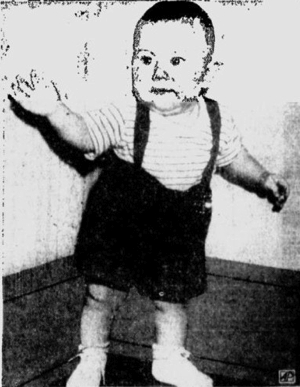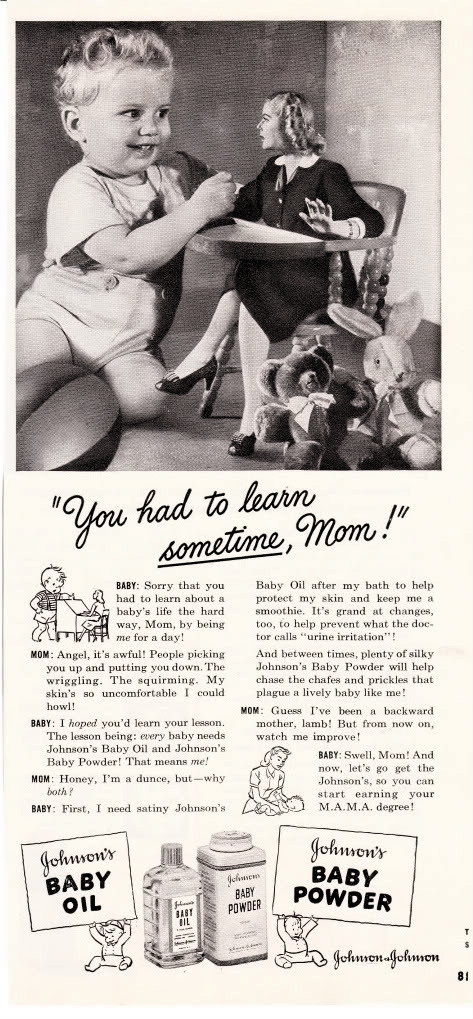Babies
The Amazing Walking Baby
Back in 1948, Norman Robert Kolreg of Lewiston, Maine, became famous when he was able to walk upright (with some help from his mother) at the tender age of 5 days. Soon Mrs. Kolreg began exhibiting him to any curiosity seeker who showed up at her door. She even took out an ad in the paper, listing his scheduled performances. She didn't charge an admission fee, but she did accept donations. Which led to criminal charges being brought against her, alleging that being exhibited was injurious to the child's "life, limb and health." The charges were dropped, but only after she agreed to stop making him perform. [The Day - Apr 2, 1948]Reportedly, little Norman kept on walking — soon without any help from Mom. I have no idea what become of him later in life.

Posted By: Alex - Tue May 07, 2013 -
Comments (5)
Category: Babies, 1940s
Go Diaper Free Week
The week of April 21-27 has been declared "Go Diaper Free! Week." Next week will be "Scrub Your Carpet Clean Week."
Posted By: Alex - Tue Apr 23, 2013 -
Comments (12)
Category: Babies, Holidays, Hygiene, Body Fluids, Excrement
Kansas Kills Sperm Donation

The state of Kansas has single handedly put sperm donation as a option for conception in jeopardy. The state is going after a man who donated his sperm to a lesbian couple for child support since the couple broke up and the custodial parent applied for welfare. The man did deliver his sperm to the couple without going through a doctor, but there was also an agreement signed by all parties relieving him of parental responsibility. Why not hold the other half of the couple accountable? Would the same thing be done by the state if a woman surrogated for a male gay couple and the same situation occured? With equal rights comes equal resposibilities don't you think?
Posted By: Alex - Fri Jan 11, 2013 -
Comments (7)
Category: Babies
Crime-Fighting Babies
Business owners in southeast London are decorating their store fronts with giant pictures of babies, in the hope that such pictures will deter criminals and rioters. [The Blaze]Maybe it's just me, but something looks odd about the baby in the picture. I think it's the hair. I know some babies are born with more hair than others, but that kid has such a full head of hair that he looks like he's wearing a wig. Also, (and I know this is not a comparison that would occur to most people) he vaguely reminds me of the (fake) baby Adolf Hitler.

Posted By: Alex - Sun Sep 09, 2012 -
Comments (5)
Category: Babies, Crime
The Attack of the 20-Foot Baby

Posted By: Alex - Wed May 30, 2012 -
Comments (7)
Category: Babies, Advertising, Giant People in Ads
My last placenta-related post… I promise
I came across the following placenta anecdote, related by Dr. H. Michener of Wichita, Kansas at the American Association of Progressive Medicine, held in Chicago, September 1917. It seemed worthy of sharing here:When the farmer returned home he found his wife and the new-comer in such a remarkably fine condition, he hastened to the barn to thank Mike for his good stewardship; but Mike replied, "I had a 'ell of a time to get the Missus to eat the afterbirth."
Posted By: Alex - Sun Apr 15, 2012 -
Comments (2)
Category: Babies, Pregnancy
More Placenta Weirdness
After posting a few days ago about the doctor who was speculating about the benefits of eating placenta, I realized I had merely scratched the surface of placenta weirdness. There's also a growing interest in placenta art — that is, smearing the placenta against a piece of paper and calling it art.
Another option is to transform your placenta into a placenta teddy bear. Your kid is sure to need years of therapy once he gets old enough to realize what he's been cuddling up with at night.

Posted By: Alex - Sat Apr 14, 2012 -
Comments (3)
Category: Art, Babies, Pregnancy
The Benefits of Placentophagy
In a recent article in the journal Ecology of Food and Nutrition, Mark Kristal argues that placentophagia (that is, the eating of afterbirth or placenta) could offer significant benefits for humans — especially considering that all other mammals (including non-human primates) do it. (link: ScienceDaily.com). These benefits might include increasing mother-infant interaction, increasing the effects of pregnancy-mediated analgesia in the delivering mother, and potentiating opioid circuits in the maternal brain that facilitate the onset of caretaking behavior. He acknowledges that these possible benefits don't warrant "the wholesale ingestion of afterbirth," but he does think the issue deserves further study.The strange thing is that although all other mammals practice placentophagy, no human cultures do (according to Dr. Kristal) — except for Hollywood celebrities.
Posted By: Alex - Mon Apr 09, 2012 -
Comments (6)
Category: Babies, Food, Nutrition, Health
Weird Shorts – 4

That’s not to say that our massive consumption doesn’t have it’s upside, As Vangelis Kapatos of Manhattan discovered when he attempted suicide by jumping from his ninth floor flat, only to survive when his fall was broken by a pile of uncollected garbage. Mr. Kapatos’ timing, from his perspective, couldn’t have been worse, the unusually large garbage pile was due to collections being suspended because of snow. They were due to resume the day after his impromptu dumpster dive (Today Online).
Mind you, we’re not the only animals prone to excess. After finding the bodies of dozens of starlings near the city of Constanta in Romania, locals were concerned that the cause might be bird flu, instead post-mortems of the birds have revealed that they in fact died of alcohol poisoning, having ‘drunk’ themselves to death on the discarded leftovers of the local winemaking industry. A least they died happy (BBC News).
Better than dying happy, though, is living happy, and the secret of that, says the UK’s Office for National Statistics, is having a job. But it’s not the pay but the job security that counts, say the government statisticians, which ironically are facing staff cuts themselves due to the economic downturn. Other key happiness factors, according to the preliminary report, are good personal health and a decent family life. What will we do without these people (Telegraph)?
More in extended >>
Posted By: Dumbfounded - Thu Jan 13, 2011 -
Comments (4)
Category: Animals, Dinosaurs and Other Extinct Creatures, Armageddon and Apocalypses, Babies, Crime, Death, Human Marvels, Inebriation and Intoxicants, Religion, Sexuality, Weird Names, Body Fluids, Perfume and Cologne and Other Scents

| Who We Are |
|---|
| Alex Boese Alex is the creator and curator of the Museum of Hoaxes. He's also the author of various weird, non-fiction, science-themed books such as Elephants on Acid and Psychedelic Apes. Paul Di Filippo Paul has been paid to put weird ideas into fictional form for over thirty years, in his career as a noted science fiction writer. He has recently begun blogging on many curious topics with three fellow writers at The Inferior 4+1. Contact Us |




